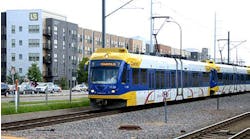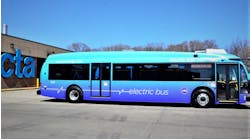April 27--WASHINGTON COUNTY -- Washington County would be on the hook to collect a transit sales tax for at least another three years if the county board voted now to pull out of a metrowide transit effort.
It also would have to pay off its transit-related debt sooner than planned, county staff told the board in a workshop Tuesday.
Three years ago the board voted 3-2 to join four other metro counties -- Anoka, Hennepin, Ramsey and Dakota -- in collecting a quarter-cent sales tax and pooling the funds for transit projects, to be managed by the Counties Transit Improvement Board.
County commissioner Bill Pulkrabek was one of the two "no" votes, and he has argued ever since that taxes collected in the county are more than what will ever be returned on transit projects. Commissioner Autumn Lehrke, who was not on the board for the original vote, has said she thinks there could be a more efficient way to fund transit projects.
Pulkrabek argued that about $20 million in sales taxes have been collected in Washington County since the tax was implemented in July 2008, but only a little more than $10 million has been spent or is scheduled to be spent in the county by 2013. He said he is skeptical of future spending projections for projects in the county.
County board chairman Gary Kriesel pointed out Tuesday that the transit tax does not come just from Washington County residents, but from anyone who shops there.
In order to withdraw from CTIB, the county must give
three years' notice and develop a plan to pay off all identified debt obligations, county transportation planner Ted Schoenecker said Tuesday.
The withdrawal would have to be unanimously approved by the other CTIB members.
If the withdrawal were accepted, the county would continue to collect the transit tax for three years for its share of CTIB operations. After that, the county would have the option to continue collecting the tax to pay down its acquired debt, or to find an alternate funding source.
The level of the county's obligations is still an unknown, Schoenecker said, but could be about $8 million. With interest and other factors, that could increase.
At the earliest, if withdrawal is approved before a June 30 deadline, Washington County could be out of CTIB by January 2014, Schoenecker said, noting that there are several assumptions factored into that timeline.
Kriesel said withdrawing now would amount to throwing away the millions of dollars already collected from county shoppers. He likened the process to putting money away to buy a car later, saying there's no immediate return.
"CTIB at least minimizes the risk to property taxes," Kriesel said. "Transit projects are expensive."
Pulkrabek said he's concerned by proposed legislation that "could blow up CTIB or raid its funds."
Lehrke agreed, saying CTIB is not a stable source of funding.
There are three transit corridors in Washington County. The Gateway Corridor spans Interstate 94 between St. Paul and Wisconsin, and is currently in the study phase. The Red Rock Corridor, which roughly follows U.S. 61 from St. Paul to Hastings, is being eyed for future commuter rail. The Rush Line Corridor follows U.S. 61 north to Hinckley via White Bear Lake and Forest Lake, and recently launched commuter coach service.
Commissioner Lisa Weik said she didn't want to see Washington County, which is a border metro county and an important connection to Wisconsin, become "a fly-over zone."
"This is a dedicated funding source," she said of CTIB. "It increases our chances of obtaining federal funds."
Without CTIB, the county would be responsible for securing local funding for transit projects on its own.
Tuesday's presentation was intended to provide commissioners "a platform to bring forward an alternate way to develop transit," if they want to, Kriesel said.
"But we are in CTIB, that's our model ... unless someone steps forward and is able to articulate a better vision for Washington County," he said.
Elizabeth Mohr can be reached at 651-228-5162.
___
To see more of the Pioneer Press, or to subscribe to the newspaper, go to http://www.twincities.com.
Copyright (c) 2011, Pioneer Press, St. Paul, Minn.
Distributed by McClatchy-Tribune Information Services.
For more information about the content services offered by McClatchy-Tribune Information Services (MCT), visit www.mctinfoservices.com, e-mail [email protected], or call 866-280-5210 (outside the United States, call +1 312-222-4544)


